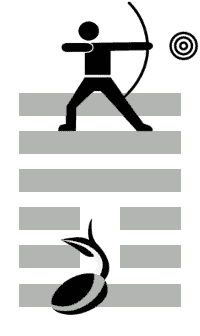無妄 wú wàng – A Japanese friend tells me about the meaning of the Chinese characters in the Chinese name of hexagram 25 – innocence. The first character means “scarifier tooth of the tiger”, the second means “release” or “letting go”. Later, a Chinese friend tells me that both characters are classical, so he cannot read them. This is not surprising: the Japanese adopted the classical Chinese characters and still use them today, while the Chinese have moved on to modern Chinese and therefore cannot read the old characters.
So do you become innocent by letting go of your scarifier teeth? I later learned from another source that 無妄 wú wàng is actually often translated as “innocence” or “the unplanned”, in the sense of “not misguided”, “not delusional”, “not intentionally constructed”. If you combine this translation with the idea that you become innocent as soon as you let go of your own tiger’s teeth, you get a peculiar, almost paradoxical form of purity. A purity that is not a primal state of childish naivety, but the result of a conscious, ethical decision, namely to let go of one’s own aggressive, narcissistic, egocentric impulses that threaten social coexistence.
But what exactly are these tiger teeth? They are certainly not markers of individual moral guilt – for such guilt presupposes free will. Scarifier teeth, however, are not chosen; they are given and thus part of the human condition, part of our nature. We are born with them, just as we are born with our drives, our narcissism, and so on. In this sense, innocence may not be the most accurate translation of 無妄 wú wàng, since innocence implies the prior existence of guilt. But tiger’s teeth are not something we’ve freely chosen – they’re simply part of what it means to be human.
So when we let go of our tiger’s teeth, we are not freeing ourselves from any guilt. What we are doing is leaving behind something raw, untamed. Therefore, refinement or sublimation might better describe what 無妄 wú wàng points to – a process of transformation in which the natural is not denied, but transformed into something else. Not necessarily something gentle, but something more open, more ethical, more attuned to the demands of human coexistence.
Further Questions on Hexagram 25
- One user writes: “After an unpleasant event a few months ago, I am more or less in a kind of crisis. I have my life under control and am getting along reasonably well, but emotionally I am still very shaken. Since then I have been trying to understand as best I can what actually happened – also by consulting the I Ching.”
- Another user asks: “Please, tell me how the story between me and x will develop further during the next year!”
- A user has met a person in a very unique way who later on turned out to be very important to her. Her question: “Will we meet again? Or: What’s the point?”
- One user asks: “What’s next?”
Excursus: I Ching and Psychoanalysis
Hexagram 25 – innocence
Keywords: Socialization and Guilt | The Other as the Structuring Force of the Subject
How does a biological being become a social subject? According to Jacques Lacan, it is the Other – the you, our counterpart – that makes us into subjects. Language, as the order of the symbolic, is not merely a means of communication, but the very structure that shapes, regulates, and even gives rise to desire. With our entry into the symbolic order – language, law, and social norms – guilt also enters the scene: or more precisely, the structure of guilt.
The subject can never fully realize its desire – it must repress, sacrifice, or sublimate parts of its impulses in order to exist within the order of the Other. This is a painful and conflictual process – but also a creative one. Through it, the subject gains access to responsibility, relationship, and ethics.
In this sense, hexagram 25- Innocence suggests the possibility of an innocence after guilt: not a primal state before socialization, but a position aligned with the symbolic. It suggests a form of purity that is no longer disturbed by narcissistic desire or imaginary self-images. One has let go of the “scarifier’s teeth” – that is, the raw vitality of the drives – or rather, one has tamed them in the process of socialization. The result is a form of purity in one’s relationship to the Other – not an empty, externally enforced conformity that merely seeks to satisfy the demands of the Other.
Understood in this way, “innocence” is not a naïve, childlike state, nor a state of unspoiled purity, but the result of a conscious ethical act, in which destructive impulses are renounced and the individual is integrated into the order of the collective – without completely renouncing his or her own desires. It is a precarious balance, constantly renewed, between autonomy and recognition, between instinct and language, between the self and the Other.
The current interpretation can be found here: https://www.no2do.com/hexagramme_en/788777.htm



